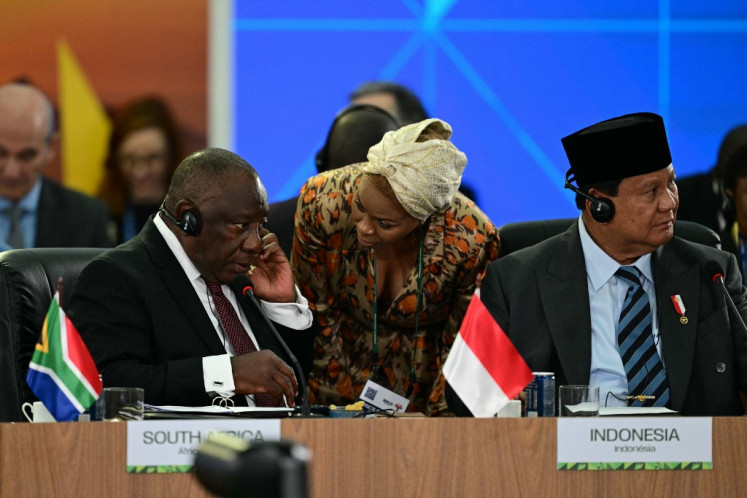Popular Reads
Top Results
Can't find what you're looking for?
View all search resultsPopular Reads
Top Results
Can't find what you're looking for?
View all search resultsBiden administration inching into double theater of war
But what is lurking behind the scenes is the specter of Iran upping the ante in its seeming support of various Sunni and Shia proxies to challenge the US armed forces head-on.
Change text size
Gift Premium Articles
to Anyone
 Up in arms: People lift rifles and placards as they chant during an anti-Israel and anti-United States rally in the Houthi-controlled capital Sanaa on Jan. 19, 2024, protesting the US designation of Yemen's Houthi rebels as “terrorists“, after a series of attacks on Red Sea shipping amid ongoing battles between Israel and the militant Hamas group in Gaza. (AFP/Mohammed Huwais)
Up in arms: People lift rifles and placards as they chant during an anti-Israel and anti-United States rally in the Houthi-controlled capital Sanaa on Jan. 19, 2024, protesting the US designation of Yemen's Houthi rebels as “terrorists“, after a series of attacks on Red Sea shipping amid ongoing battles between Israel and the militant Hamas group in Gaza. (AFP/Mohammed Huwais)
D
uring George HW Bush's presidency (1988-1992) the decisive expulsion of Iraqi forces from Kuwait in 1991, following Saddam Hussein's mistake of invading Kuwait in August 1990, epitomized the United States' military dominance, heralding what Charles Krauthammer in TIME magazine termed "America's Unipolar Moment".
Just as importantly, Bush Sr. proclaimed to Americans and the global audience that the US had surmounted its “Vietnam trauma”, asserting a newfound readiness to engage militarily worldwide to uphold the US’s interpretation of what is "right".
The US military capabilities were also carefully recorded and displayed by CNN, with the missiles zinging in and out of buildings, not unlike what is displayed in Bollywood films, showcasing the “surgical”, and almost “clinical” nature of the Pentagon's “smart bombs”.
This military doctrine would, in turn, evolve to become a "zero casualty war" during the era of the Bill Clinton administration (1992-2000).
The 1999 US aerial bombardment of Kosovo further perpetuated the myth of invincibility, successfully compelling figures like Slobodan Milosevic to accede to US and the North Atlantic Treaty Organization (NATO) demands, despite his contested claim over the remnants of Yugoslavia, which had effectively dissolved with the Dayton Peace Accord in 1995.
By bombing the militias in Iraq and Syria, ostensibly as a retaliation against the drone attacks on Tower 22 in Jordan on Feb. 28, causing the death of three US soldiers and injuring 47 others, the US underscores its readiness to claim victory prematurely, revealing a pattern of optimistic military engagement.
Not surprisingly, the likes of The New York Times and the Washington Post announced that the military retaliation by the US has been a success. Meanwhile, the likes of the LA Times and The Boston Globe did not find it important to warrant a serious long read.


















